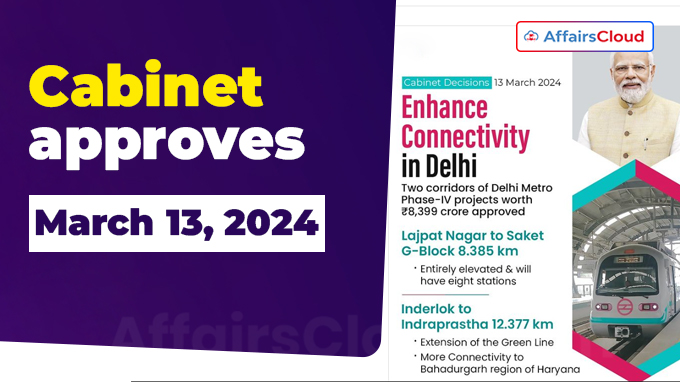 The Union Cabinet chaired by Prime Minister (PM) Narendra Modi approved the following proposals on 13th March 2024,
The Union Cabinet chaired by Prime Minister (PM) Narendra Modi approved the following proposals on 13th March 2024,
i.Two corridors of Delhi Metro Phase-IV projects namely
- Lajpat Nagar to Saket G-Block
- Inderlok to Indraprastha
ii.Inter-Governmental Framework Agreement between India and UAE on cooperation for the empowerment and operation of the India-Middle East Europe Economic Corridor.
iii.Signing of an MoU between India and Bhutan on cooperation in the field of Energy Efficiency and Energy Conservation Measures.
iv.Signing of an Agreement between India and Bhutan in the area of Food Safety.
v.Signing of MoU between India and Bhutan on General Supply of Petroleum, Oil, Lubricants (POL) and related products from India to Bhutan.
Approval of Two Corridors of Delhi Metro Phase-IV Projects
The Union Cabinet Chaired by PM Narendra Modi approved two new Delhi Metro corridors connecting Lajpat Nagar to G Block in Saket and Inderlok to Indraprastha Costing Rs 8,399 crore.
- The project is funded by the Government of India, the Government of Delhi, and international funding agencies.
- It will benefit around 2.5 lakh commuters
- The combined length of the corridors is approximately 20.762 Kilometre (km)
| Corridor | Length | Station | Extension of | Connecting with |
|---|---|---|---|---|
| Inderlok to Indraprastha | 12.377 km | 10 stations | Green Line | Red, Yellow, Airport Line, Magenta, Violet and Blue Lines |
| Lajpat Nagar to Saket G-Block | 8.385 km | 8 stations | Golden Line | Silver, Magenta, Pink and Violet Lines |
About Delhi Metro IV Phase Projects
i.The Priority Corridors of Phase 4 of the Delhi Metro are expected to be finished and opened in June 2026, which is later than the initial deadline of December 31, 2024.
ii.The Three Priority Corridors are
- Aerocity to Tughlakabad (Golden Line)
- R.K Ashram to Janakpuri (West) (Magenta Line)
- Mukundpur – Maujpur (Pink Line)
Additional Information
i.Inderlok – Indraprastha line will have 11.349 km of underground lines and 1.028 km of elevated lines.
ii.The new Inderlok – Indraprastha line will improve connectivity to the Bahadurgarh region of Haryana
iii.The Delhi Metro Rail Corporation Limited (DMRC) currently has a network of 391 kilometers, with 286 stations operational.
Approval of Inter-Governmental Framework Agreement Between India and UAE
The Union Cabinet has given its Ex-post facto approval to the Inter-Governmental Framework Agreement (IGFA). The agreement was signed on February 13, 2024, during a high-level visit between the Republic of India and the United Arab Emirates’ (UAE) governments.
- The agreement aims to operate the India-Middle East Europe Economic Corridor (IMEC).
Significance
i.The IGFA aims to strengthen bilateral relations between two countries in the Ports, Maritime, and Logistics sectors.
ii.It includes areas of cooperation for exploring future joint investment and collaboration in the development of IMEC.
iii.The Agreement provides a detailed framework for cooperation based on mutually agreed principles, guidelines, and regulations.
About India-Middle East Europe Economic Corridor (IMEC)
i.It was signed at the G-20 Summit in New Delhi to create a comprehensive transport network.
ii.The signatories to the agreement are India, United States of America (USA), Saudi Arabia, UAE, the European Union, Italy, France, and Germany.
iii.It includes Railroad, Ship-to-Rail networks, and Road transport routes that will extend across two corridors.
- East Corridor -India to the Arabian Gulf,
- Northern Corridor – the Gulf to Europe.
iv.The IMEC corridor will also have an electricity cable, a hydrogen pipeline, and a high-speed data cable.
v.This project aims to Connect India, the Middle East & Europe via rail, road & sea to improve transport efficiency, reduce costs, promote economic unity & generate employment. Cross-border ship-to-rail transit network to facilitate trade & connectivity, transforming integration of Asia, Europe & Middle East.
Cabinet approves signing of Memorandum of Understanding (MoUs) Between India and Bhutan
For co-operation in the field of Energy Efficiency and Energy Conservation Measures
The Union Cabinet, chaired by PM Narendra Modi, has approved the signing of the Memorandum of Understanding (MoU) between India and Bhutan on extending cooperation in the fields of energy efficiency and energy conservation measures.
- It was signed between the Bureau of Energy Efficiency (BEE), Ministry of Power, Government of India, and Department of Energy, Ministry of Energy and Natural Resources, Royal Government of Bhutan.
Significance
i.Energy-intensive appliances are causing an increase in household and commercial energy consumption. Consumers can optimize this rising demand by choosing high-efficiency appliances.
ii.India aims to promote energy efficiency in Bhutan by facilitating the country’s adoption of India’s star labeling program and building codes.
iii.This will be achieved through the institutionalization of energy auditor training, the creation of a pool of energy professionals, and retailer training to disseminate energy-efficient products to consumers in Bhutan.
iv.The MoU will enable India and Bhutan to exchange information, data, and technical experts related to energy efficiency and conservation.
About India’s Star Labelling Program
i.BEE’s labeling program informs consumers about energy-saving appliances.
- It was launched in 2006
ii.Currently it covers 37 appliances. The program aims to reduce energy consumption without compromising quality.
For Food Safety
The Union Cabinet has approved the signing of an agreement between the Bhutan Food and Drug Authority (BFDA), Ministry of Health, Royal Government of Bhutan, and Food Safety and Standards Authority of India (FSSAI) Ministry of Health & Family Welfare, Government of India for cooperation in the areas of food safety.
Significance
i.This will greatly improve the trade between two neighbouring countries.
ii.To ensure that the products being exported to India comply with the requirements prescribed by FSSAI, the BFDA will issue a Health Certificate.
- This certificate will serve as evidence of compliance, making it easier and more efficient for businesses to conduct trade.
iii.As a result, the cost of compliance will be reduced for both countries.
For the General Supply of Petroleum, Oil, Lubricants (POL), and Related Products from India to Bhutan
The Union Cabinet approved the signing of the MoU between the Government of India and the Royal Government of Bhutan on the General Supply of Petroleum, Oil, Lubricants (POL) and related products from India to Bhutan.
Significance
i.This agreement aims to improve economic and commercial linkages, particularly in the hydrocarbon sector.
ii.It will ensure a secure and long-term supply of petroleum products to Bhutan
About United Arab Emirates (UAE)
President – Mohamed bin Zayed Al Nahyan
Capital– Abu Dhabi
Currency- UAE dirham
About Bhutan
Prime Minister– Tshering Tobgay
Capital- Thimphu
Currency- Bhutanese ngultrum




